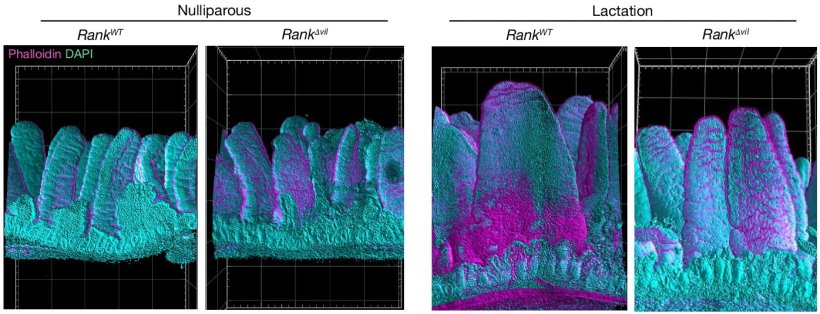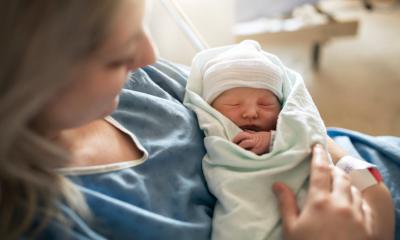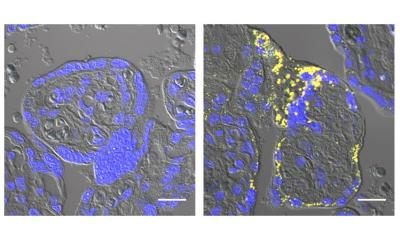
Image source: Onji M et al., Nature 2024 (CC BY 4.0)
News • Striking structural reorganisation
Pregnancy and nursing massively changes up mothers' intestines
Scientists discover the molecular and structural principles of intestinal changes in pregnancy, critical for nutrient uptake and the health of babies
When women are pregnant and nurse their babies, their bodies change and various organs, such as the breasts or the immune system, are adapted to ensure the health of both mother and child. This happens throughout evolution in all mammals. An international research team led by Josef Penninger, Scientific Director of the Helmholtz Centre for Infection Research (HZI), and Masahiro Onji from the Medical University of Vienna now reports the surprising finding that the intestine also changes completely in pregnant and nursing females, resulting in a doubling of the intestinal surface area and a striking structural reorganisation. The researchers also provide the first genetic and mechanistic evidence of how this intestinal epithelial expansion occurs in mothers, with direct implications for the transgenerational health of the babies. The study has now been published in the journal Nature.

Image source: HZI; © Kirill Salewkskij
A multinational team led by Josef Penninger (MedUni Vienna, IMBA - Institute of Molecular Biotechnology, Vienna, University of British Columbia, Canada, Helmholtz Centre for Infection Research, Germany) observed that the intestinal villi reorganize during pregnancy and breastfeeding and significantly enlarge, doubling their surface area. The studies were carried out in genetically modified mice and intestinal organoids from mice and humans - self-organised three-dimensional tissues derived from stem cells in the intestine. Mechanistically, the researchers identified the RANK receptor/RANK ligand (RANK/RANKL) system as the key to the villous enlargement of the small intestine during reproduction, which is regulated by sex and lactation hormones. When mice were engineered to lack the RANK/RANKL system in the intestine, the villous expansion during pregnancy and breastfeeding was significantly impaired.
For decades, researchers have studied the RANK/RANKL system as a key facilitator of essential, evolutionarily conserved processes. The Penninger group has already identified key functions of the RANK/RANKL system in bone turnover, in the biology of the mammary gland, in breast cancer, and in immune tolerance in pregnancy, contributing to the development of drugs against bone loss used by millions of people and clinical trials for breast cancer prevention and cancer immunotherapies are underway. The researchers now discovered that these intestinal changes, which appear to be completely reversible when nursing is stopped, are important for proper feeding and nourishment of the babies. "Our study shows that the impairment of this intestinal expansion by the lack of the RANK/RANKL system during pregnancy changes the milk of the nursing mothers. This results in lower weights of the babies and transgenerational long-term metabolic consequences," states the lead author Masahiro Onji.
"Mothers need to eat for themselves and their babies. These new studies provide for the first time a molecular and structural explanation of how and why the intestine changes to adapt to enhanced nutrient demand of mothers, which is probably the case in all pregnant and nursing mammals," adds study leader Josef Penninger.
Maybe we can learn from pregnant and nursing mothers to reversibly rewire this system to develop new treatments and a better understanding of intestinal cancer or gut regeneration
Josef Penninger
How mothers adapt to the demands of pregnancy and breastfeeding remains a central question of evolution and human health. During this phase, female hormones influence multiple organs to control and change their structure and functions, which is crucial for the health of the mother and the development of the offspring. It was known that pregnant women have enhanced nutrient demands. However, this fundamental aspect has not been well studied until now: "By identifying the RANK/RANKL system as the driving force behind intestinal adaptation during pregnancy and lactation, our study contributes to a deeper understanding of biological processes that are of fundamental importance for evolution and human health", says Josef Penninger, summarising the impact of the findings.
This massive expansion is controlled by sex and pregnancy hormones, which change the stem cells in the gut via the RANK/RANKL system and then give the intestinal cell a survival signal to grow much larger. This growth then leads to a near doubling of the intestinal surface area, which also increases the molecular machinery for the uptake of sugar, protein, and fat, and even leads to a profound architectural change in the intestinal villi, which probably slows down the flow of food, again maximising the uptake of nutrients. Josef Penninger: "Our team has discovered an amazing new way how mother’s bodies change to keep babies healthy. Hardly anybody knew about this, apart from a few old studies that have largely been forgotten. We have also found that this system, via stem cells, can directly affect tumours in the intestine; maybe we can learn from pregnant and nursing mothers to reversibly rewire this system to develop new treatments and a better understanding of intestinal cancer or gut regeneration."
Source: Helmholtz Centre for Infection Research
09.12.2024





